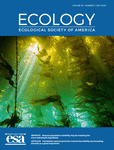
ECOLOGY
metrics 2024
Elevating ecological research with impactful contributions.
Introduction
ECOLOGY, published by Wiley, stands as a premier journal in the field of ecology, providing a vital platform for the dissemination of innovative research and insightful reviews that span various aspects of ecology, evolution, behavior, and systematics. With an impressive impact factor and ranked Q1 in the most recent category quartiles, the journal enjoys a distinguished reputation among scholars, featuring in the 92nd percentile for its subject area according to Scopus. The journal's rigorous peer-review process ensures that the published studies contribute significantly to understanding complex ecological dynamics and advancing the field's theoretical frameworks. Researchers, professionals, and students alike benefit from the rich archive that extends from 1973 to 2024, fostering interdisciplinary dialogue and collaboration. Though not an open-access journal, ECOLOGY remains committed to maintaining high standards of scholarly communication, making it an indispensable resource for anyone dedicated to the ecological sciences.
Metrics 2024
 1.95
1.95 4.40
4.40 5.50
5.50 334
334Metrics History
Rank 2024
Scopus
IF (Web Of Science)
JCI (Web Of Science)
Quartile History
Similar Journals
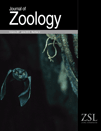
JOURNAL OF ZOOLOGY
Advancing knowledge in animal biology and ecology.JOURNAL OF ZOOLOGY, published by Wiley, stands as a premier scholarly journal in the fields of Animal Science and Zoology, renowned for its outstanding contributions to the knowledge of animal biology and ecology. With an impressive impact factor and a strong ranking in the Q1 category for Animal Science and Zoology, as well as Q2 for Ecology, Evolution, Behavior, and Systematics, the journal rigorously engages with both foundational research and groundbreaking discoveries since its inception in 1830. Located in Hoboken, New Jersey, this journal is dedicated to fostering the academic community's understanding of zoological sciences, providing access to important research that shapes wildlife conservation efforts and ecological studies. Although the journal does not currently offer open access options, it continues to attract significant attention, as evidenced by its strong Scopus rankings in related categories. Researchers, professionals, and students will find invaluable resources in the JOURNAL OF ZOOLOGY to advance their understanding of animal life and the ecological challenges it faces today.

Theoretical Ecology
Shaping ecological research with cutting-edge theoretical frameworks.Theoretical Ecology, published by SPRINGER HEIDELBERG, is a premier journal in the field of ecological modeling and theory, exemplifying the intersection of rigorous quantitative analysis and ecological understanding. With its ISSN 1874-1738 and E-ISSN 1874-1746, this journal has been a valuable resource for researchers since its inception in 2008, with a commitment to publish cutting-edge research until 2024. The journal's 2023 category quartiles demonstrate its impact, ranking Q3 in Ecological Modeling and Q2 in Ecology, reflecting its significance within the academic community. Furthermore, its Scopus rankings position it among the top tier of environmental science journals, ranking #181/461 in Ecology and #21/41 in Ecological Modeling. While the journal does not offer open access, it is an essential publication for those looking to deepen their understanding of theoretical frameworks that drive ecological research and practice. By providing a platform for innovative theories and models, Theoretical Ecology plays a crucial role in shaping future ecological studies and informing policy decisions in environmental management.
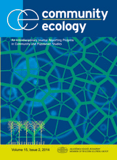
COMMUNITY ECOLOGY
Unraveling the Tapestry of Ecological NetworksCOMMUNITY ECOLOGY is a distinguished journal published by Springer Heidelberg that focuses on the intricate dynamics of ecological interactions within communities. Established in 2000 and continuing robustly through to 2024, this journal aims to disseminate significant research findings that contribute to the understanding of ecological processes, species interactions, and community structures. With an ISSN of 1585-8553 and an E-ISSN of 1588-2756, the journal holds a commendable position in the academic sphere, reflected in its Q2 quartile rankings in the categories of Ecology and Ecology, Evolution, Behavior and Systematics. It boasts an impressive Scopus ranking within the 57th percentile for both Agricultural and Biological Sciences and Environmental Science fields, attesting to its relevance and influence. Though it does not currently operate under an open access model, COMMUNITY ECOLOGY remains a vital resource for researchers, professionals, and students eager to advance their knowledge in community ecology, highlighting the importance of collaborative research in addressing ecological challenges globally.

NEW ZEALAND JOURNAL OF ECOLOGY
Championing Ecological Knowledge for a Better TomorrowNEW ZEALAND JOURNAL OF ECOLOGY, published by the New Zealand Ecological Society, stands as a premier platform for disseminating research in the field of ecology, with a notable impact factor reflected in its Q2 ranking in multiple ecology categories for 2023. Established in 1980 and actively publishing since 1982, this journal provides a vital resource for ecologists and environmental scientists, fostering the exchange of innovative ideas and methodologies. The journal covers a wide range of ecological topics, ensuring a comprehensive overview of the current trends and research developments in both ecological theory and practical applications specific to New Zealand and beyond. Researchers, professionals, and students will find in this journal an authoritative source to advance their understanding of ecological dynamics and contribute to the growing field of ecological science. The journal is accessible to the community without open access, providing critical insights that underpin the ecological landscape of New Zealand and inform sustainable practices worldwide.

CHEMOECOLOGY
Bridging Biochemistry and Ecology for a Deeper UnderstandingCHEMOECOLOGY is a prominent academic journal that delves into the intricate interactions between organisms and their chemical environments, bridging the fields of biochemistry and ecology. Published by SPRINGER BASEL AG in Switzerland, this journal has established itself as a critical resource for researchers and professionals interested in chemical ecology, particularly through its rigorous focus on the biochemical processes that govern ecological interactions. With an impact factor indicative of its influence, and categorized in the Q2 and Q3 quartiles for Ecology and Biochemistry respectively, CHEMOECOLOGY presents an array of high-quality research articles, reviews, and short communications. The journal has been continuously published from its inception in 1990 to the present, serving as a vital platform for innovative studies and discoveries in the field. Its rankings in Scopus reflect its reputation, with significant placements in both Agricultural and Biological Sciences and Biochemistry. While the journal does not offer open access, it remains an essential publication for scholars looking to explore the dynamic relationships shaped by chemical signaling in diverse ecosystems.

BIOLOGICAL JOURNAL OF THE LINNEAN SOCIETY
Advancing knowledge in ecology and evolution.BIOLOGICAL JOURNAL OF THE LINNEAN SOCIETY is a prestigious, peer-reviewed journal published by Oxford University Press that serves as a leading platform for original research in the fields of ecology, evolution, behavior, and systematics. With its ISSN of 0024-4066 and E-ISSN 1095-8312, this journal has maintained an impressive Q1 ranking in the latest Scopus statistics, which firmly positions it among the top tier of journals in its category (ranked #197 out of 721). Established in 1969, it covers a broad range of topics crucial for understanding biodiversity and the evolutionary processes shaping it, with its coverage extended until 2024. Though it does not operate under an open-access model, it ensures wide visibility and dissemination of impactful research findings. The journal is key for researchers, professionals, and students dedicated to advancing knowledge in biological sciences, fostering interdisciplinary collaboration, and addressing pressing ecological challenges.
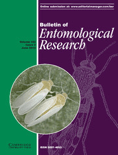
BULLETIN OF ENTOMOLOGICAL RESEARCH
Pioneering Research at the Nexus of Entomology and HealthBULLETIN OF ENTOMOLOGICAL RESEARCH, published by Cambridge University Press, is a prestigious journal that has been at the forefront of entomological research since its inception in 1910. With an impressive track record extending through to 2024, this journal serves as a vital platform for advancing knowledge in various related fields, notably Agronomy and Crop Science and Insect Science, where it ranks in the top quartile (Q2) and maintains a commendable position within the Scopus rankings in its categories. Notably, its contributions also intersect with Medicine in a broader scope, fostering interdisciplinary insights. While access to the journal content is not classified as 'Open Access,' its rigorous peer-reviewed articles are crucial for researchers, professionals, and students seeking to enhance their understanding of entomology and its applications in agronomy and beyond. The journal's impact is reflected in its notable percentile rankings, emphasizing its relevance and influence in the academic community. Located at the heart of the UK, the BULLETIN OF ENTOMOLOGICAL RESEARCH continues to be an essential resource for those dedicated to the study and understanding of insects and their impacts on agriculture and health.

JOURNAL OF INSECT BEHAVIOR
Fostering Collaboration in Insect Science ResearchJOURNAL OF INSECT BEHAVIOR, published by SPRINGER/PLENUM PUBLISHERS, stands as a pivotal platform for disseminating cutting-edge research in the fields of insect science and behavioral ecology. Since its inception in 1988, the journal has continuously contributed to our understanding of insect behavior and its ecological implications, boasting an impressive range of studies that address both evolutionary and systemic perspectives. With its current rankings placing it in the Q3 quartile for both Ecology, Evolution, Behavior and Systematics and Insect Science categories, the journal is positioned within the competitive landscape of agricultural and biological sciences, offering insightful contributions to practitioners and academics alike. Although currently not an open-access journal, it ensures wide accessibility through numerous academic institutions and libraries, thereby fostering global collaboration. Researchers, professionals, and students are encouraged to engage with the rich array of articles that not only advance theoretical knowledge but also inform practical applications in managing insect populations and preserving biodiversity.

Journal of Vertebrate Biology
Enhancing global awareness through scientific inquiry.Journal of Vertebrate Biology, a reputable publication established by the Institute of Vertebrate Biology in the Czech Republic, serves as a vital platform for research across the fields of Animal Science and Zoology, Aquatic Science, and Ecology, Evolution, Behavior and Systematics. With its ISSN 2694-7684 and a commendable 2023 Q2 ranking in multiple categories, this open-access journal embraces innovative scientific inquiry and fosters academic discourse. The journal's commitment to disseminating high-quality research is reflected in its Scopus rankings, positioning it within the top quartile in several impactful areas. As it continues to converge its focus until 2024, researchers, professionals, and students alike are encouraged to engage with cutting-edge studies that advance our understanding of vertebrate biology. This publication stands out not only in its scholarly contributions but also in enhancing global awareness of biodiversity and conservation issues.
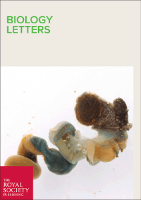
Biology Letters
Connecting ideas to transform biological understanding.Biology Letters, published by the esteemed Royal Society, stands at the forefront of research in the field of biological sciences, with a strong emphasis on innovative studies that bridge gaps across disciplines. Since its inception in 2005, the journal has garnered significant recognition, achieving a remarkable Q1 ranking in Agricultural and Biological Sciences (miscellaneous) and a percentile of 88th in the same category, according to Scopus rankings. Released in the United Kingdom, the journal offers a platform for authors to share concise research findings and theoretical perspectives that contribute meaningfully to the advancement of biological inquiry. Although not open access, the journal remains highly regarded in the academic community for its rigorous peer-review process and impactful content, making it an invaluable resource for researchers, professionals, and students dedicated to exploring the complexities of biology. With an ongoing commitment to excellence, Biology Letters continues to shape the future of biological sciences.